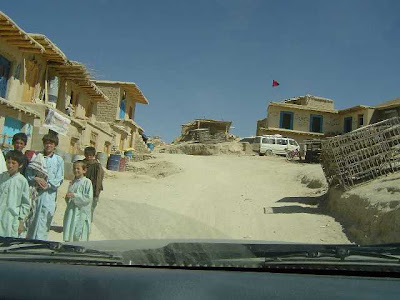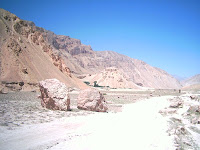A New Chapter in Punjab: Simplicity, Challenges, and Resilience
After weeks of bureaucratic hurdles, nerve-wracking travel, and cultural adjustments, I finally began my duties in Punjab—a remote town nestled in Afghanistan’s Hazarajat region. My arrival marked the start of a journey defined by unpredictability, resourcefulness, and the raw beauty of a land steeped in contrasts.
First Days: Settling In
Ian, my New Zealand-born line manager and Program Manager, greeted me at the CHF office. Typically based in Bamyan (a two-hour drive away), he had traveled to Punjab to onboard me. My role? Leading the local engineering team to assess sites for school and clinic construction across Punjab and Daikundi provinces.
Building the Team:
Our first task was hiring a translator. No HR protocols, no panels—just three candidates and a straightforward interview.
We chose Qudarat (third from left in the photo), a sharp, Hindi-speaking local with grit and wit. His appointment was immediate, a refreshing departure from red tape. In Afghanistan, necessity trumps procedure.
The Field Mission Begins
The next morning, our convoy—three cars, seven engineers, Qudarat, and myself—set off to evaluate six sites. No route maps, no local contacts, no appointments. Just GPS coordinates and a mandate to assess technical and legal feasibility.
Into the Unknown:
7:00 AM Departure: Trucks loaded, we left Punjab for Safed Naour, our first site—a proposed clinic location 2.5 hours away.
The Pai Konak Pass: At 3,400 meters, the highest point in the region, the road snaked through jagged peaks and valleys dotted with wheat fields. Dust swirled as our vehicles jolted over rocks, past mud-brick villages where life moved at a centuries-old pace.
A Race Against Nightfall
By 6:00 PM, shadows lengthened across the mountains. Security protocols forbade travel after dark, yet shelter was scarce. Nili, Daikundi’s capital, felt perpetually “just ahead.” Desperation mounted until we spotted an ACF (Action Against Hunger) clinic in Ulukan.
Unexpected Sanctuary:
The medical team offered three rooms and a kitchen. Hot food and a warm shower revived us—luxuries in the wilderness. We slept deeply, grateful for safety.
Dawn Push to Nili
At 5:45 AM, we resumed the drive, reaching Nili by 9:00 AM. The provincial capital, though modest, buzzed with a semblance of order. Here, the real work would begin: negotiating land rights, evaluating soil stability, and rallying community buy-in.

Reflections from the Field
Simplicity in Action: Hiring Qudarat in hours, not weeks, underscored the efficiency of necessity-driven decisions.
Trust in Technology (and Luck): GPS coordinates became our lifeline in lieu of local knowledge—a blend of modernity and improvisation.
Security vs. Reality: Protocols clashed with terrain realities, forcing adaptive compromises.
The Afghan Paradox
Punjab’s stark beauty—barren mountains against emerald valleys—mirrored the duality of life here: harsh yet hopeful. Each site visit was a lesson in humility, a reminder that progress in Afghanistan demands equal parts grit and grace.
In the Hindu Kush, plans are guidelines, not rules. Survival hinges on resilience—and sometimes, a warm meal in a stranger’s clinic. 🏔️🚙
Note: The journey continues, but for now, the mountains have granted respite. Next: navigating tribal negotiations and the art of building trust in a land where time bends to its own rhythm



 .........
......... Our convoy set off from Kabul at dawn, aiming to reach Bamyan by afternoon and proceed to Panjab the next day. The 7-8 hour drive promised treacherous terrain, including Taliban-controlled zones, but daytime travel was deemed safe. Optimism quickly faded when one of our Toyota Corollas suffered a blown tire barely outside Kabul. “Pratham grasse maxika!” (First problem already!), I muttered. Two hours later, we resumed the journey on a bone-rattling, dust-choked road that flung me against the roof with every pothole.
Our convoy set off from Kabul at dawn, aiming to reach Bamyan by afternoon and proceed to Panjab the next day. The 7-8 hour drive promised treacherous terrain, including Taliban-controlled zones, but daytime travel was deemed safe. Optimism quickly faded when one of our Toyota Corollas suffered a blown tire barely outside Kabul. “Pratham grasse maxika!” (First problem already!), I muttered. Two hours later, we resumed the journey on a bone-rattling, dust-choked road that flung me against the roof with every pothole.
 At 5:00 AM, bleary-eyed, we sipped bitter green tea and resumed the drive. By 7:00 AM, Bamyan’s iconic Buddha statues (since destroyed) loomed into view. At the CHF office, Ian, a New Zealander project manager, greeted me briefly before departing for Panjab. Terry Lancashire, an Australian colleague, offered a warmer welcome.
At 5:00 AM, bleary-eyed, we sipped bitter green tea and resumed the drive. By 7:00 AM, Bamyan’s iconic Buddha statues (since destroyed) loomed into view. At the CHF office, Ian, a New Zealander project manager, greeted me briefly before departing for Panjab. Terry Lancashire, an Australian colleague, offered a warmer welcome.



